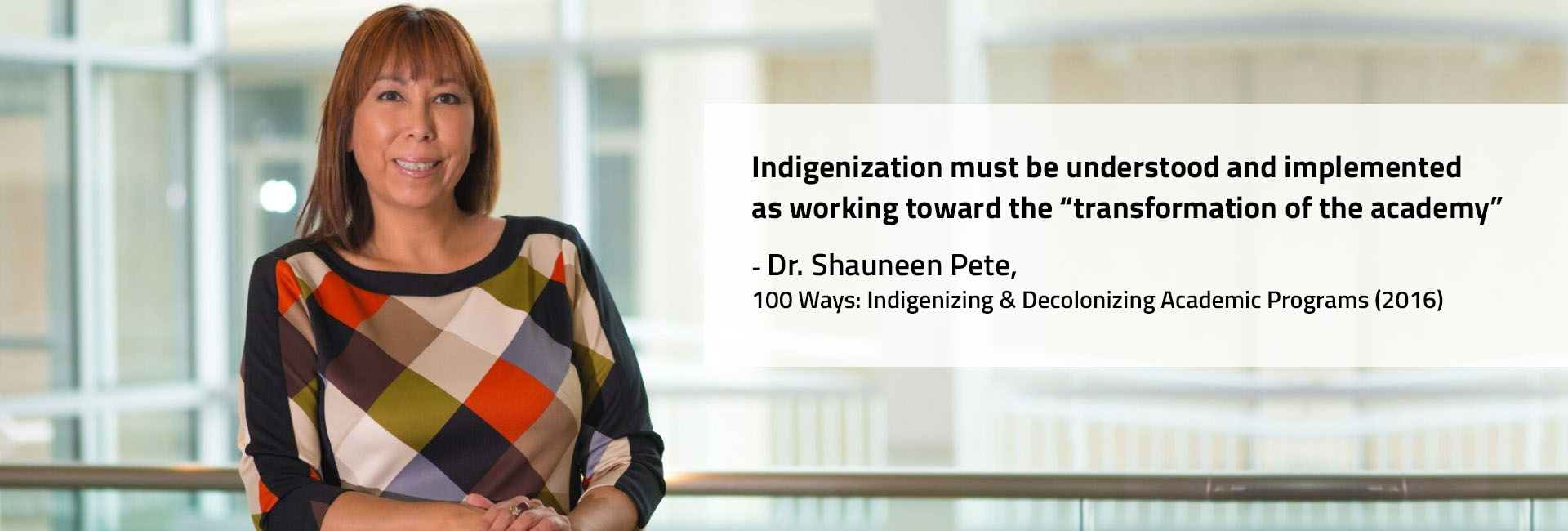Getting Started

Dr. Shauneen Pete, 100 Ways: Indigenizing & Decolonizing Academic Programs (2016)
We all come from diverse backgrounds, so we all have our own unique starting point on this journey. This page is meant to offer general information that many may find useful.
The Centre for Teaching and Learning also offers one-on-one consultations for faculty seeking individualized support in their efforts to indigenize.
Indigenization of the Academy
Universities Canada Principles on Indigenous Education
Universities Canada represents universities across Canada, which educate more than a million students each year. Indigenous students continue to be underrepresented in Canadian higher education institutions and our universities are committed to do their part to close this education gap, recognizing the urgency of this issue for the country. Closing the gap will strengthen Indigenous communities, allow Indigenous peoples to continue to strive for self-realization, enhance the informed citizenship of Canadians, and contribute to Canada’s long-term economic success and social inclusion. Learn more.
Indigenization at the University of Alberta
To learn more about current initiatives on campus, check out the Office of the Provost’s Indigenous Initiatives.
Key Readings
- The Truth and Reconciliation Commission resources and Calls to Action.
- Gaudry, Adam and Danielle Lorenz. 2018. “Indigenization as Inclusion, Reconciliation, and Decolonization: Navigating the Different Visions for Indigenizing the Canadian Academy.” AlterNative 14(3): 218–227.
- Indigenous Canada MOOC by the Faculty of Native Studies, University of Alberta.
- Universities Canada Principles on Indigenous Education.
Allyship
Being an ally with Indigenous peoples is complex and multifaceted. In order to do so effectively, it is necessary to commit to both the ongoing learning about Indigenous peoples and the issues they face, as well as a concerted unlearning of the unconscious ways that racialized systems and systems of power seek to oppress.
According to Smith, Pucket, and Simon “allyship is a means to an end: the reconciliation of historical and contemporary wrongdoings and the rectification of the inequitable colonial systems” (2016, 6). To begin your work as an ally to Indigenous peoples, some useful resources are:
- Accomplices Not Allies: Abolishing the Ally Industrial Complex
- Indigenous Ally Toolkit - Montreal Urban Aboriginal Community Strategy Network
- Smith, J., Puckett, C., & Simon, W. (2016). Indigenous allyship: An overview. Laurier Office of Aboriginal Initiatives.
- Regan, P. (2010). Unsettling the settler within: Indian residential schools, truth telling, and reconciliation in Canada. Vancouver: UBC Press.
Learn more by reading our next section on Land Acknowledgments.
Additional Resources
- Snow, K. (2018). What Does Being a Settler Ally in Research Mean? A Graduate Students Experience Learning From and Working Within Indigenous Research Paradigms. International Journal of Qualitative Methods. https://doi.org/10.1177/1609406918770485
- Queen’s University 10 Ideas for First Steps
- What is Decolonization? What is Indigenization?